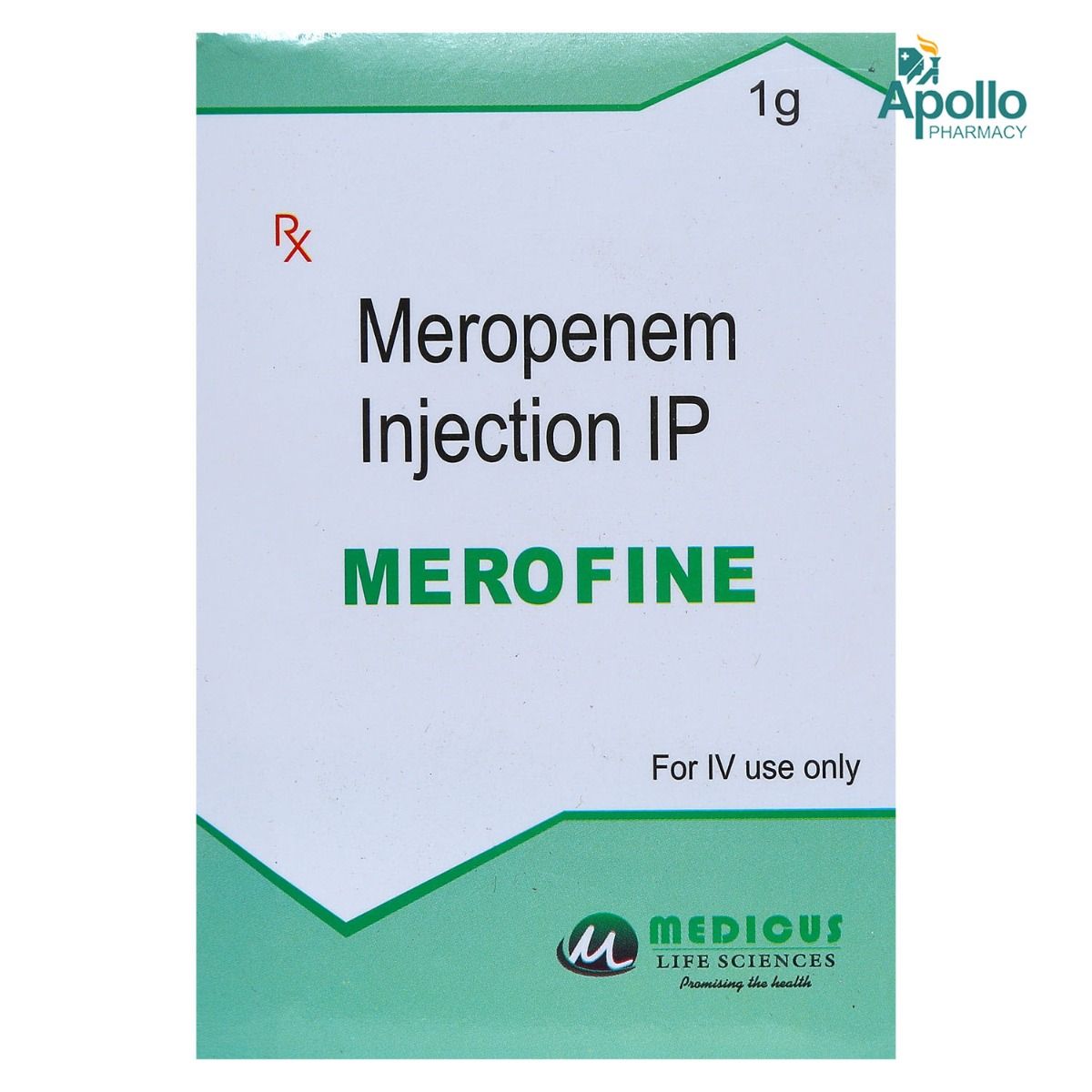Meropenem
About Meropenem
Meropenem is used to treat severe bacterial infections. It treats bacterial infections of various body parts like skin, soft tissues, blood, brain (meningitis), lungs (pneumonia), and urinary tract. A bacterial infection is a condition in which bacteria grows in the body and causes infection. It can target any body part and multiple very quickly.
Meropenem contains Meropenem, which helps to treat bacterial infections by killing the bacteria (bactericidal). It prevents the formation of the bacterial protective cell wall, which is required for bacteria to survive. And it helps treat bacterial infections effectively.
You are advised to take Meropenem for as long as your doctor has prescribed it for you, depending upon your medical condition. In some cases, you may experience nausea, vomiting, diarrhoea, constipation, headache, pain, redness, pain, or swelling at the injection site, insomnia (difficulty falling asleep or staying asleep), and sores in the mouth or throat. Most of these side effects of Meropenem do not require medical attention and gradually resolve over time. However, if the side effects are persistent, reach out to your doctor.
If you are known allergic to Meropenem or any other medicines, let your doctor know. Inform your doctor if you have ever had a kidney or liver disease, seizures (fits), or epilepsy. If you have watery and bloody stools, please visit your doctor immediately, as this could be a sign of a new infection. Regular monitoring of kidney function and the blood cell count is required while taking Meropenem.
Uses of Meropenem
Medicinal Benefits
Meropenem is a broad-spectrum antibiotic containing Meropene known to fight against a wide variety of bacterial infections. It is used to treat infections of various body parts like complicated skin and soft tissue infections, blood, lungs (pneumonia including ventilator-associated pneumonia), and severe urinary tract infections. It also effectively treats infection in the brain, known as meningitis (infection of the membranes surrounding the brain and spinal cord). It works by killing the bacteria (bactericidal). It prevents the formation of a bacterial protective cell wall, which is required for bacteria to survive. And effectively treat bacterial infection.
Directions for Use
Storage
Side Effects of Meropenem
- Pain
- Nausea
- Vomiting
- Diarrhea
- Headache
- Constipation
- Abdominal (stomach) pain.
- Insomnia (difficulty falling asleep or staying asleep)
- Redness, pain, or swelling at the injection site
- Sores in the mouth or throat
Drug Warnings
Do not take Meropenem if you are allergic or have had a severe reaction to meropenem or any other ingredients of Meropenem. Inform your doctor if you have or have ever had kidney disease, seizures (fits), epilepsy or if you participate in regular physical activity. Patients with epilepsy should tell their doctor before taking Meropenem. If you have watery and bloody stools, please visit your doctor immediately, as this could be a sign of a new infection.
Drug Interactions
Drug-Drug Interaction: Meropenem is known to interact with anti-epilepsy medicines (valproic acid, divalproex sodium), and anti-gout medicine (probenecid).
Drug-Food Interaction: Meropenem should not be taken along with alcohol as it might further affect mental alertness and cause excessive drowsiness.
Drug-Disease Interaction: Meropenem is known to interact in people having a brain or brain tumour, epilepsy, kidney disease or if you are on dialysis.
Drug-Drug Interactions Checker List:
Safety Advice

Alcohol
cautionMeropenem can affect alertness and coordination. So, alcohol consumption should be avoided as it might further reduce alertness and cause excessive drowsiness.

Pregnancy
cautionMeropenem is a category B pregnancy drug. It is not known to harm the baby. But it should only be taken if prescribed by a doctor.

Breast Feeding
cautionMeropenem should only be taken in breastfeeding women if prescribed by a doctor.

Driving
cautionMeropenem can affect alertness and coordination. So, operating machinery which requires concentration should be avoided.

Liver
cautionMeropenem to be taken with caution, especially if you have had a history of liver disease. Your doctor will have to change the dosage depending on your medical condition and your reaction to treatment.

Kidney
cautionMeropenem to be taken with caution, especially if you have had a history of kidney disease. Your doctor will have to change the dosage depending on your medical condition and your reaction to treatment.

Children
cautionMeropenem is generally safe for children aged above 3 months. A doctor should only give it at a hospital.
Habit Forming
Diet & Lifestyle Advise
Do not drink or eat a lot of caffeine-containing products such as coffee, tea, energy drinks, cola, or chocolate. Meropenem may increase nervousness, sleeplessness, and anxiety caused by caffeine.
Probiotics should be taken after taking the full course of Meropenem to restore some healthy bacteria in the intestines that may have been killed. Taking probiotics after antibiotic treatment can reduce the risk of antibiotic-associated diarrhea. Certain fermented foods like yogurt, cheese, sauerkraut, kombucha, and kimchi can help restore the intestine's good bacteria.
Include more fiber-enriched food in your diet, as it can be easily digested by your gut bacteria, which helps stimulate their growth. Thus, fiber-rich foods may help restore healthy gut bacteria after a course of antibiotics. Whole grains like whole-grain bread, brown rice should be included in your diet. Make sure you drink plenty of water or other fluids every day while you are taking Meropenem.
Avoid alcoholic beverages with Meropenem as it can make you dehydrated and may affect your sleep. This can make it harder for your body to aid the Meropenem in fighting off infections.
Special Advise
Do not take valproic acid with Meropenem as it is contra-indicate.
Regularly monitor your kidney function and blood count while taking Meropenem.
Patients Concern
Disease/Condition Glossary
Bacterial Infection: A bacterial infection is a condition in which harmful bacteria enter, multiply, and infect our body. It can target any body part and multiple very quickly. When you get infected with bacteria, you can experience generalized symptoms, like fevers, chills, and fatigue. Bacteria are of various forms comprising, commonly spherical, rod, and spiral-shaped. Bacterial infections vary from minor illnesses like sore throat and ear infections to severe brain infections like meningitis and encephalitis. A few harmful bacteria that cause infections include Streptococcus, Staphylococcus, and E. coli. Anyone can become infected with a bacterial infection. However, people with weak immune systems or taking immunosuppressive medicine can be more prone to bacterial infection.
Meningitis: It is a bacterial infection of the membranes that surround the brain and spinal cord.
FAQs
Meropenem belongs to a class of drugs known as 'antibiotics', primarily used to treat severe bacterial infections.
Meropenem is a broad-spectrum antibiotic containing Meropene that works by killing the bacteria (bactericidal in nature). It prevents the formation of a bacterial protective cell wall, which is required for bacteria to survive. And effectively treat bacterial infection.
Antibiotic medicines like Meropenem can cause diarrhea, which may be a sign of a new infection. If you have watery or bloody stool, visit your doctor immediately. Also, do not use any anti-diarrheal medicines on your own unless suggested by your doctor.
No, Meropenem is known to contra-indicate with valproic acid and increase the episodes of seizures. So, both medicines should not be taken together to avoid any unpleasant side effects.
Yes, Meropenem can cause a serious allergic reaction, including anaphylaxis (serious allergic reaction to a medication), which can be life-threatening. If you have itching, trouble breathing or swallowing, and have swelling in your hands or face, please visit your doctor.
The most common side effects are nausea, vomiting, diarrhea, constipation, headache, pain, redness, pain, or swelling at the injection site. Most of these side effects of Meropenem do not require medical attention and gradually resolve over time.
Drug resistance is a condition which occurs when the bacteria gets modified in the body and stops reacting to the medicine. As a result, the medicine no longer works. Resistance to Meropenem is not very common at least for the bacteria against which it works.
Although rare reports indicate that Meropenem may decrease the blood sugar levels, it does not affect everyone. However, it is important to regularly monitor your blood sugar levels. If you experience any sudden drop in blood sugar levels, consult your doctor.
Meropenem is generally safe for children above 3 months of age. It is only administered by a doctor at a hospital.
No, do not stop taking Meropenem without consulting your doctor even if you feel better as it may increase the risk of developing an infection that is resistant to medication. Therefore, complete full course of treatment.





